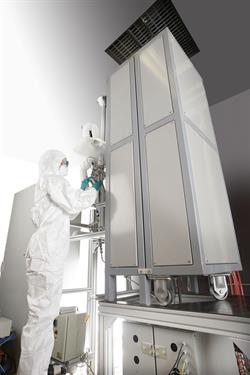Apr 20 2015
Researchers at VTT Technical Research Centre of Finland Ltd have devised a new, inexpensive metallic nanoparticle manufacturing technique.

The aerosol technology reactor employed for nanoparticle synthesis is capable of producing carbon-coated particles, particles of various alloys and a number of pure metal particles. It can even produce several grams and kilograms of nanoparticles every day.
Nanoparticles are suitable for applications including energy technology, tailoring the electrical and magnetic properties of polymers, drug dosing and medical diagnostics, and conductive and magnetic inks. VTT is looking forward to commercialize the technique.
"Demand has outstripped supply in the nanoparticle markets. This has been an obstacle to the development of product applications; nano-metal composites are scarce and often available in small quantities only. We wanted to demonstrate that it was possible to produce nanomaterials in considerable quantities cost-effectively," commented Ari Auvinen of VTT, head of the research team.
The goal of the project was to produce 200 to 3000g of nanoparticle a day, which has been already achieved. However, due to small wastages incurred while using the equipment, it is necessary to maintain remote-control production for several days.
In several instances, metallic nanoparticles are industrially produced through chemical reduction in liquid solutions. Another commonly used technique is the energy-consuming plasma synthesis that involve considerable amount of material wastages.
The cost-effectiveness and scalability of the synthesis were the key factors considered while designing the reactor developed by VTT. As a result, the nanoparticle synthesis was carried out in the presence of air pressure and at low temperature. This proves that the reactor can be developed from commonly used industrial materials by consuming less amount of energy.
The process results in extremely high nanoparticle concentration generated at high speed and with low gas consumption. Further, this technique allows the use of impure metallic salts as raw materials thereby reducing the material costs.
VTT has tested various methods of producing carbon-coated materials, metallic compounds and nanometals to illustrate the practical functionality of its reactor. The reactor has been used for the production of materials including carbon-coated magnets that serve as catalysts in biorefineries. The magnets are then efficiently collected and recycled.
Nanoparticles are also employed in the production of magnetic inks and electrically conductive inks applied in printed electronics. VTT, for instance, has successfully used a permalloy ink for printing a magnetically anisotropic material for the manufacture of magnetic field sensors.
Another application trial conducted by VTT includes the process of eliminating microwave reflection. The tests proved that it is possible to reduce the reflection by 10,000 times in polymers with the addition of particles that increase radar wave attenuation.
The researchers reported different applications of the reactor besides the above mentioned applications. The silicon nanoparticles produced by the reactor may even boost the lithium battery capacity by a factor of 10.
Other potential applications to be tested include silicon-based materials for thermoelectric and solar power components, materials for the 3D printing of metal articles, nanomagnets for medical diagnostics applications and high permeability polymers.